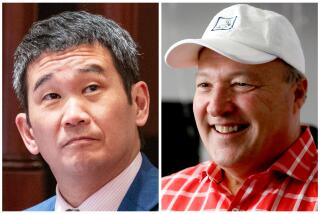Baugh Says New Donor Limits Impede Defense
SACRAMENTO â Assemblyman Scott Baugh is facing felony campaign wrongdoing charges, but his biggest problem these days isnât prosecutors. Itâs his checkbook.
The Huntington Beach Republican was depending on hefty campaign donations from sympathetic benefactors to pay off his mounting lawyer bills, but a new state restriction on contributions has put a serious crimp in Baughâs defense fund.
Proposition 208, overwhelmingly approved by California voters last November, limits personal contributions to state lawmakers such as Baugh to $250 each campaign season.
With his legal defense costs expected to swell upward to $300,000 by the time the Orange County district attorney is finished prosecuting him on charges related to campaign finance disclosure, Baugh doesnât see any way he can afford the bill.
âI owe my lawyers money. Iâve got donors lined up to help, but Iâm terrified to accept their money for fear the D.A. will come down on me for that,â Baugh said. âIâve spent more than $100,000. I have to raise another $100,000 to $200,000 to complete my defense. Itâs virtually impossible to raise that kind of money in $250 chunks. I donât know that many people who would give me $250 each.â
Backers of Proposition 208 have a simple answer for Baugh: Tough luck.
They contend that the ballot measureâs intent all along has been to limit the sway rich benefactors have on politicians.
â[A big donation] has the appearance of undue influence, whether itâs for a campaign or legal defense,â said Tony Miller, former acting secretary of state and a chief booster of Proposition 208. âItâs something he needs to live with. He apparently needs more friends.â
Officials at the state Fair Political Practices Commission, which has taken on the task of enacting the law, are still debating the enforcement of Proposition 208 as it relates to the legal defense issue.
Gary Huckaby, the FPPCâs spokesman, said final resolution of Baughâs predicament with Proposition 208 remains âup in the air.â It likely wonât be concluded until the commissionâs meeting next month, if by then.
Baugh calls his quandary âan unconstitutional Catch-22â and suggested he might mount a court challenge to Proposition 208 because of his fund-raising difficulties.
âYou are effectively denied the ability to defend yourself,â he complained.
Unlike the broad-based legal fights that lawyers for the Democratic and Republican parties have promised to wage in the coming weeks against the proposition, Baugh suggested he could narrowly challenge the new law based on his inability to fund a sufficient legal defense.
âBear in mind, Iâm not on a crusade to wipe out Proposition 208,â Baugh said. âI just think it effectively denies me the ability to defend myself.â
One of the top Democrat political lawyers in the state suggested Baugh would have at the very least an interesting case to make.
Joe Remcho, a San Francisco attorney helping lead the Democratsâ fight against Proposition 208, said a move against it by Baugh âcould go to the head of the classâ and be expedited because of the assemblymanâs looming criminal case.
Short of filing a separate lawsuit, Baugh could ask the judge handling his criminal case to issue an order freeing him from Proposition 208 because it conflicts with his efforts to mount an adequate defense, Remcho said.
And while the inevitable appeals of such a constitutional challenge might be fast-tracked, it could still effectively put a hold on Baughâs criminal predicament, Remcho said. Questions over Proposition 208âs effect on Baugh, he said, âwould get in the wayâ of the criminal case.
Baughâs attorneys are already working hard to derail the prosecution. He was supposed to have a preliminary hearing this week on five felony charges of perjury and 13 misdemeanor charges alleging violations of the Campaign Reform Act.
But his attorneys filed motions Tuesday asking to have the state attorney general assume command of the case, arguing that Orange County Dist. Atty. Michael R. Capizzi has overstepped his prosecutorial discretion and is using the case to promote his own political fortunes.
Capizzi and his top deputy handling the Baugh case did not return a phone call for comment but have said they prosecute allegations of political corruption without regard to political party.
Most of the charges against Baugh relate to his alleged misreporting of tens of thousands of dollars of campaign loans and contributions in the days leading up to the special recall election in November 1995.
Baugh replaced then-Assemblywoman Doris Allen (R-Cypress), who raised the ire of fellow Republicans by being elected speaker earlier in 1995 with the support of Assembly Democrats but only one Republican.
More to Read
Sign up for Essential California
The most important California stories and recommendations in your inbox every morning.
You may occasionally receive promotional content from the Los Angeles Times.










